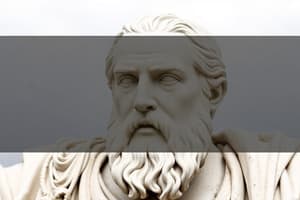Podcast
Questions and Answers
ماذا يعني مصطلح فلسفة؟
ماذا يعني مصطلح فلسفة؟
حب الحكمة.
من هو فيثاغورس؟
من هو فيثاغورس؟
عالم رياضيات وعالم فيزياء ، يُنسب إليه اكتشاف نظرية فيثاغورس.
قال هيراقليطس بأنّ التغيير هو جانب دائم من جوانب الحياة.
قال هيراقليطس بأنّ التغيير هو جانب دائم من جوانب الحياة.
True (A)
ما هي أفكار ديمقراطوس الرئيسية؟
ما هي أفكار ديمقراطوس الرئيسية؟
ما هي سنة و البلد التي تأسست فيها الجمعية الوطنية للسباحة الهواة؟
ما هي سنة و البلد التي تأسست فيها الجمعية الوطنية للسباحة الهواة؟
ما هو اسم السباح الذي أصبح أول شخص ُيعبر قناة المانش بالسباحة؟
ما هو اسم السباح الذي أصبح أول شخص ُيعبر قناة المانش بالسباحة؟
من هو السبّاح الذي فاز بأول ميدالية أولمبية للّفلبّين؟
من هو السبّاح الذي فاز بأول ميدالية أولمبية للّفلبّين؟
ما هي أنواع سباقات السباحة المعترف بها في السباحة التنافسية؟
ما هي أنواع سباقات السباحة المعترف بها في السباحة التنافسية؟
ما هي سنة التي بدأت فيها سباحة السباحة في بريطانيا كنشاط ترويحي؟
ما هي سنة التي بدأت فيها سباحة السباحة في بريطانيا كنشاط ترويحي؟
Flashcards
الفلسفة
الفلسفة
هو دراسة مجموعة من المواضيع مثل المنطق ، أخلاقيات ، ميتافيزيقيا ، معرفة ، جمالية و فلسفة اللغة لمعرفة طبيعة الأشياء والحقائق ، وفهم العالم من حولنا.
فلاسفة
فلاسفة
الأشخاص الذين يدرسون الفلسفة أو ينخرطون فيها.
نظرية فيثاغورس
نظرية فيثاغورس
هو نظرية رياضية تقول أنه في مثلث قائم الزاوية ، مربع الوتر يساوي مجموع مربعي الضلعين الآخرين
أفلاطون
أفلاطون
Signup and view all the flashcards
أرسطو
أرسطو
Signup and view all the flashcards
سقراط
سقراط
Signup and view all the flashcards
الحوار
الحوار
Signup and view all the flashcards
التفكير الكلي
التفكير الكلي
Signup and view all the flashcards
التفكير الجزئي
التفكير الجزئي
Signup and view all the flashcards
المعرفة
المعرفة
Signup and view all the flashcards
الوقائع
الوقائع
Signup and view all the flashcards
الآراء
الآراء
Signup and view all the flashcards
المزاعم
المزاعم
Signup and view all the flashcards
الاستنتاج
الاستنتاج
Signup and view all the flashcards
رياضات مائية
رياضات مائية
Signup and view all the flashcards
سباقات القوارب
سباقات القوارب
Signup and view all the flashcards
التزلج على الماء
التزلج على الماء
Signup and view all the flashcards
التزلج باللوح
التزلج باللوح
Signup and view all the flashcards
ركوب الكاياك
ركوب الكاياك
Signup and view all the flashcards
السباحة
السباحة
Signup and view all the flashcards
السباحة
السباحة
Signup and view all the flashcards
السباحة
السباحة
Signup and view all the flashcards
السباحة
السباحة
Signup and view all the flashcards
السباحة
السباحة
Signup and view all the flashcards
السباحة
السباحة
Signup and view all the flashcards
السباحة
السباحة
Signup and view all the flashcards
السباحة
السباحة
Signup and view all the flashcards
السباحة
السباحة
Signup and view all the flashcards
السباحة
السباحة
Signup and view all the flashcards
السباحة
السباحة
Signup and view all the flashcards
السباحة
السباحة
Signup and view all the flashcards
السباحة
السباحة
Signup and view all the flashcards
Study Notes
Philosophy
- Philosophy comes from two Greek words, Philo (love) and Sophia (wisdom), originally meaning "love of wisdom".
- Philosophers investigate ultimate causes, reasons, and principles.
- Pythagoras, a mathematician and scientist, formulated the Pythagorean theorem and established a community of learners.
- Heraclitus proposed a higher order or plan (logos) underpinning all existence, emphasizing constant change.
- Democritus proposed that matter is composed of tiny particles called atoms, and studied natural phenomena.
- Diogenes of Sinope advocated for a simple and virtuous lifestyle, demonstrating virtue through action.
- Socrates, considered a key figure, didn't claim to be wise but helped others find wisdom through questioning (the Socratic method).
- Plato, a student of Socrates, developed ideas on knowledge, and established the Academy.
- Aristotle, a student of Plato, developed a system of logic and reasoning with emphasis on perception.
- Epicurus proposed a philosophy of happiness, emphasizing wisdom and a simple life.
Branches of Philosophy
- Aesthetics: deals with beauty and what makes things beautiful.
- Logic: deals with correct reasoning.
- Epistemology: explores the nature of knowledge and knowing.
- Ethics: addresses moral questions and dilemmas.
- Metaphysics: explores reality and existence.
Practical Uses of Philosophy
- Improves problem-solving and decision-making.
- Enhances critical analysis and interpretation of concepts, ideas, definitions, and arguments..
- Develops strong communication skills for expressing and presenting ideas and arguments.
- Cultivates wisdom by applying knowledge to everyday life and decision-making.
Holistic Thinking
- Holistic thinking considers the overall pattern or system, looking at the "big picture."
- It requires an open mind to get a general sense of the situation.
Partial Thinking
- Focuses on specific aspects of a situation or problem
- Analytical thinking is a component of partial thinking and it considers specific areas of a problem or issue to understand it.
Methods of Philosophizing
- Media interactions (friends, family, community, etc.) can be a great source of information, but some information may be false.
Knowledge
- Clear awareness and understanding of something. It's based on facts and verifiable information.
- Knowledge compromises of ideas and beliefs, and how knowledge is related to truth .
Facts
- Statements observed to be true or real.
- Used as evidence and to make arguments.
Opinions
- Statements that might be true, needing evidence to support them.
- May incorporate facts along with perspectives to reach conclusions or explain matters.
Claims
- Statements that are not readily known to be true, requiring examination.
Conclusions
- Judgments based on established facts.
Water Activities
- Categorizes water sports based on immersion, such as boating, cable skiing, canoeing, canoe polo, fly boarding, fishing, jet skiing, kayaking, kite boarding, knee boarding, paddle boarding, parasailing, rafting, river trekking, rowing, skimboarding, surfing, wakeboarding, water polo, water basketball, windfoiling, yachting, aqua jogging, synchronized swimming, diving, finswimming, triathlon.
Swimming
- Swimming has a rich history, with evidence found dating to the Stone Age.
- Specific strokes like front crawl and butterfly, as well as backstroke and breaststroke, exist.
Studying That Suits You
Use AI to generate personalized quizzes and flashcards to suit your learning preferences.




